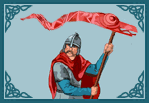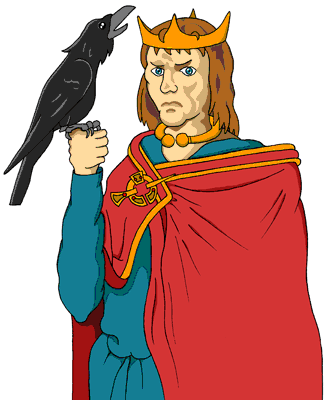 |
 |
|||
|
|
Urien was perhaps the most famous of the British kings of the North. His epithet shows how closely he was associated with his kingdom. North Rheged is traditionally undestood to have stretched across Cumberland and Westmorland due to various references to Urien in the poems of his contemporary, Taliesin, who was said to be his personal bard. He is there varioulsy called Ruler of Rheged, Ruler of Llwyfenydd and Lord of Erechwydd. Llwyfenydd is interpreted as the Valley of the River Lyvennet, south-east of Penrith. Erechwydd is a word that can be translated as 'Land of the Fresh Water' and is presumed to refer to the Lake District. His main power-base is traditionally thought to have been at Caer-Ligualid (Carlisle) as it had been the local Roman administrative centre and is known to have retained a British community into the 7th century. Medieval literary stories tell how the city played host to King Arthur when he was in the North. It may have been chosen because of the association with Urien. Urien was one of the sons of King Cynfarch Oer of North Rheged. When his father died, the kingdom may initially have been divided between Urien and his brother, Llew. Llew may have ruled in Galwyddel (Galloway). Rheged is believed to have once stretched north of the Solway Firth into this area since Din-Rheged (now Dunragit) is located there. The brothers were triplets along with Arawn who was traditionally the Archbishop of Brittany. Urien's relations with other northern kings, both British and Anglo-Saxon, are recorded in the ancient Welsh poetry of Taliesin and Llywarch Hen, as well as by Nennius in his Historia Brittonum. Those with his fellow British monarchs were erratic. He apparently made raids on rival kingdoms as far north as Manau Gododdin. However, towards the end of a long reign, Urien led a coalition of British Kings against the expanding Anglo-Saxons. His allies included Kings Riderch Hael (the Generous) of Strathclyde, Gwallawc Marchawc Trin (the Battle Horseman) of Elmet and, probably, Morcant Bulc of Bryneich. Many battles were fought including Gwen Ystrad and the Cells of Berwyn. This latter, probably fought at the Roman Fort of Brememium (High Rochester) may have later been turned into High-King Arthur's supposed 11th Battle, of Breguoin. After the defeat of the Ebrauc kings, Peredur Arueu Dur (Steel Arms) and Gwrgi, by the Bernicians in AD 580, Urien seems to have quickly claimed the strategic region around Catraeth (Catterick), before the Anglo-Saxons of Bernicia and Deira were able to secure the area and unite their two peoples. This struggle may have culminated in the Battle of Argoed Llwyfein (Leeming Lane, Yorks). It was at this battle that King Theodoric Flamddwyn (the Firebrand) of Bernicia was killed by Urien's son, Owein. By around AD 585, the Bernicians under Hussa were almost totally defeated. Pushed back to the Sea's edge, the British besieged them on Ynys Metcaut (Lindisfarne) for three days, while Irish allies, under King Fiachna of Ulster, ousted the Anglo-Saxons from Din-Guardi (Bamburgh). However, before Urien could seize victory and finally rid Britain of the Anglo-Saxon scourge, he himself was treacherously assassinated at Aber Lleu (Ross Low, on teh mainland opposite Lindisfarne). His assassin, a nocturnal foreigner by the name of Llofan Llaf Difo (Severing-Hand), cut-off Urien's head at the instigation of the King's own ally, Morcant. The latter was, apparently, jealous of Urien's victories and thought that he should lead the push to rid his own kingdom of the Anglo-Saxon menace. His plan, of course, completely backfired and the Anglo-Saxons soon re-asserted their stranglehold on the North. Urien was succeeded by his son, Owein. In Arthurian literature, Urien is is transformed into 'Sir Uriens' the King of Gore. He is there held to have married King Arthur's half-sister, the enigmatic Morgan Le Fay. The King of Rheged, however, was of the next generation, so Morgan may have been the daughter of Letan Luyddoc and the High-King's niece as some sources insist. Welsh tradition calls her Modron ferch Afallach, although the father's name here has unfortunate immortal overtones. Late traditions associating Urien with Gwyr (Gower - possibly the origin of the name Gore) in South Wales are probably derived from the fact that Urien's son, Pasgen, or his descendants later settled in the area. Records of King Urien date back to the 6th century. He is generally considered historic.
|
|||
| © Nash Ford Publishing 2001. All Rights Reserved. | ||||





 Urien Rheged,
Urien Rheged,